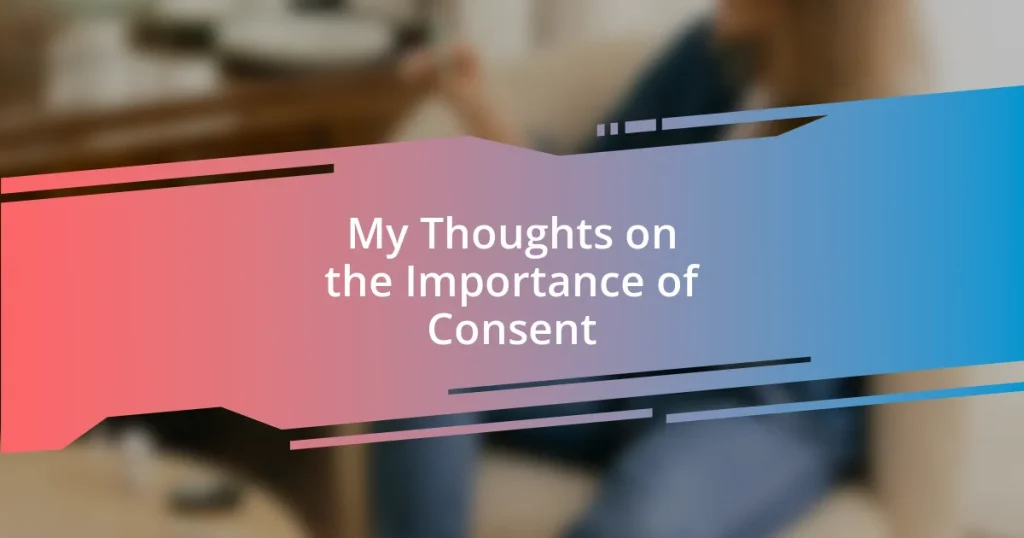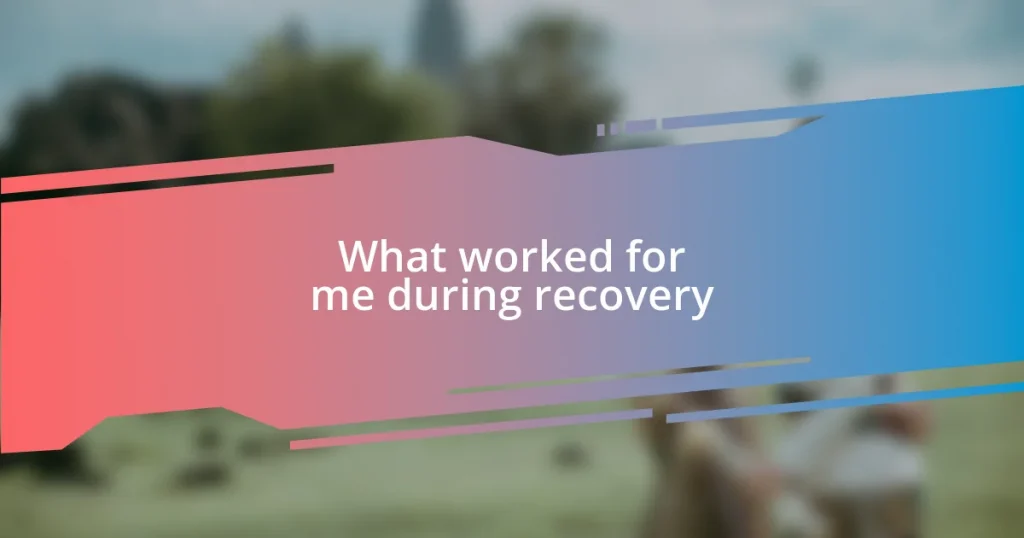Key takeaways:
- Consent is a nuanced concept that requires ongoing communication, understanding, and respect for comfort levels in all relationships.
- Enthusiastic consent is essential; it should be explicit, actively engaged, and continuously checked throughout interactions.
- Common misconceptions include assuming consent based on past interactions, believing consent is only necessary at the beginning, and relying solely on non-verbal cues for consent.
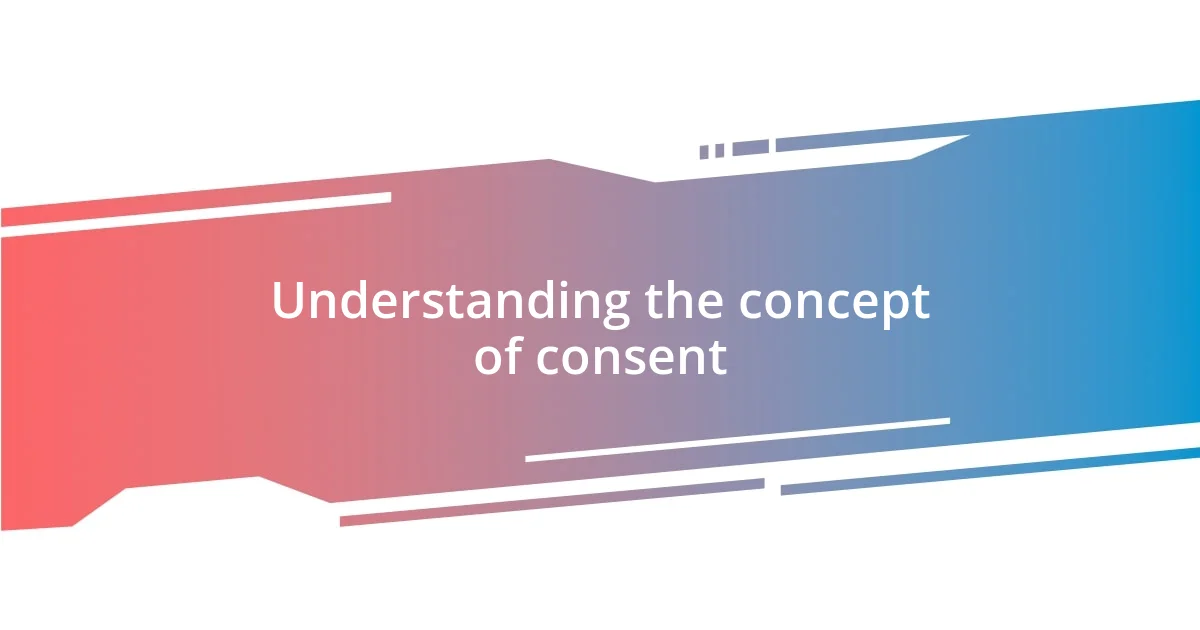
Understanding the concept of consent
Consent is often perceived as a simple yes or no, but in my experience, it’s so much more nuanced. For instance, I remember a time in my early twenties when a friend and I had a heart-to-heart about boundaries. It made me realize that consent isn’t just about agreement; it’s about mutual understanding and respect for each other’s feelings and comfort levels.
Reflecting on this, I often wonder if people truly grasp the implications of consent in their everyday lives. It’s not just relevant in intimate relationships but also in friendships and professional settings. I’ve witnessed situations where assumptions were made, leading to misunderstandings and discomfort. These moments made me keenly aware of how vital it is to actively communicate and continually check in with each other’s feelings.
Consent can shift based on context and emotional states, which adds layers to its importance. I recall a situation where someone confidently said yes but later felt uneasy about their decision. It taught me that consent should be ongoing; it can be revoked at any time. How do you ensure that you’re truly connecting with someone’s comfort levels? It’s about creating a safe space for open dialogue, where both parties feel free to express their feelings without fear of judgment.
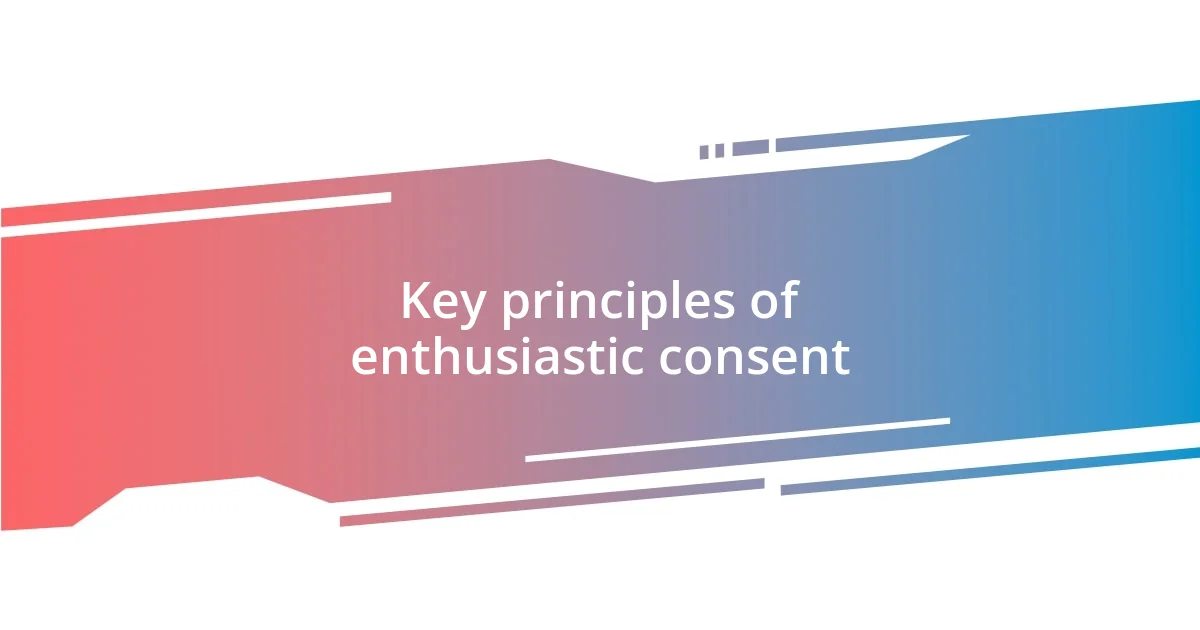
Key principles of enthusiastic consent
Enthusiastic consent is rooted in the idea that both parties are fully engaged and eager to participate. I recall a time when I was at a gathering, where two friends discussed their boundaries openly before getting intimate. This clear communication brought an energy to the room that was palpable, as everyone felt more connected and at ease. It reminded me that consent should be exciting for both parties, creating a sense of safety and eagerness.
Another fundamental principle involves clarity. I once found myself in a situation where someone assumed I was comfortable with a decision because I hadn’t explicitly said no. It was a wake-up call for me, highlighting how crucial it is to express desires clearly. The notion of consent isn’t merely a lack of opposition; it’s about a clear and affirmative agreement from everyone involved. Asking questions like, “Are you comfortable?” or “What do you want?” can transform interactions and make everyone feel valued.
Lastly, the principle of ongoing consent cannot be neglected. It’s an evolving process, not a one-time checkmark. I’ve had experiences where I initially felt excited, but as things progressed, I needed to reevaluate my feelings. This taught me that it’s essential to create an environment where both parties can comfortably change their minds. After all, embracing open dialogue is what keeps the spirit of enthusiasm alive in any relationship.
| Principle | Description |
|---|---|
| Engagement | Both parties should be eager and involved in the consent process, creating a positive atmosphere. |
| Clarity | Consent must be explicitly communicated and understood, moving beyond mere absence of contradiction. |
| Ongoing Nature | Consent is not static; it can evolve and should be checked in on consistently throughout interactions. |
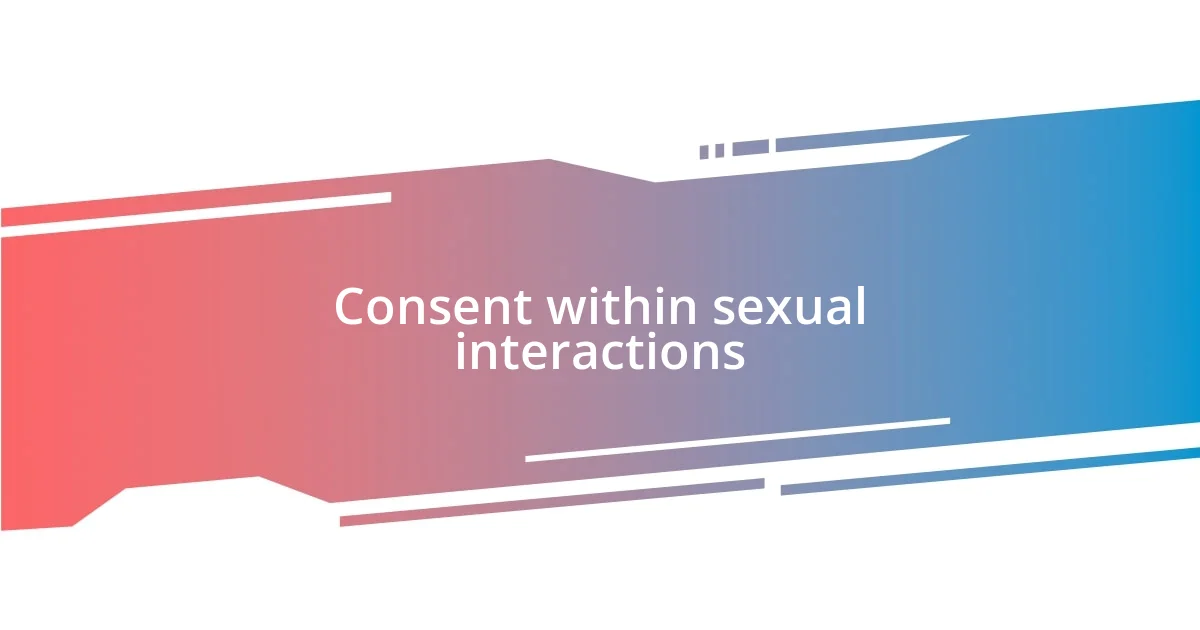
Consent within sexual interactions
When it comes to sexual interactions, understanding consent can significantly impact the experience. I remember a moment when a partner and I were about to take a step forward in our relationship. Instead of jumping in, we paused to discuss what we were both comfortable with. That open exchange not only deepened our bond but also made the experience far more enjoyable. It was a clear reminder that consent isn’t merely a box to check—it’s the foundation of a healthy interaction.
- Mutual Openness: I believe it’s vital for both partners to feel heard and respected in their feelings.
- Emotional Readiness: Checking in on each other’s emotional states can lead to a more rewarding experience.
- Non-Verbal Cues: I’ve learned that body language can indicate comfort or discomfort just as strongly as words can.
Reflecting on my past experiences, I’ve realized that consent can sometimes feel like a dance. It’s about feeling the rhythm of the moment. I once found myself in a situation where things began to escalate, but I sensed a hesitation in my partner. Instead of moving forward, I chose to ask if they felt okay. That simple question opened up a dialogue that ultimately brought us closer together. In sexual interactions, being attuned to these subtle shifts can make all the difference.
- Active Listening: Engaging in conversations about what each partner wants can foster trust.
- Recognizing Signals: I encourage everyone to pay attention not only to spoken consent but also to any changes in demeanor.
- Creating Space for Questions: It’s important to allow room for any concerns or uncertainties; it contributes to a more fulfilling experience for both parties.
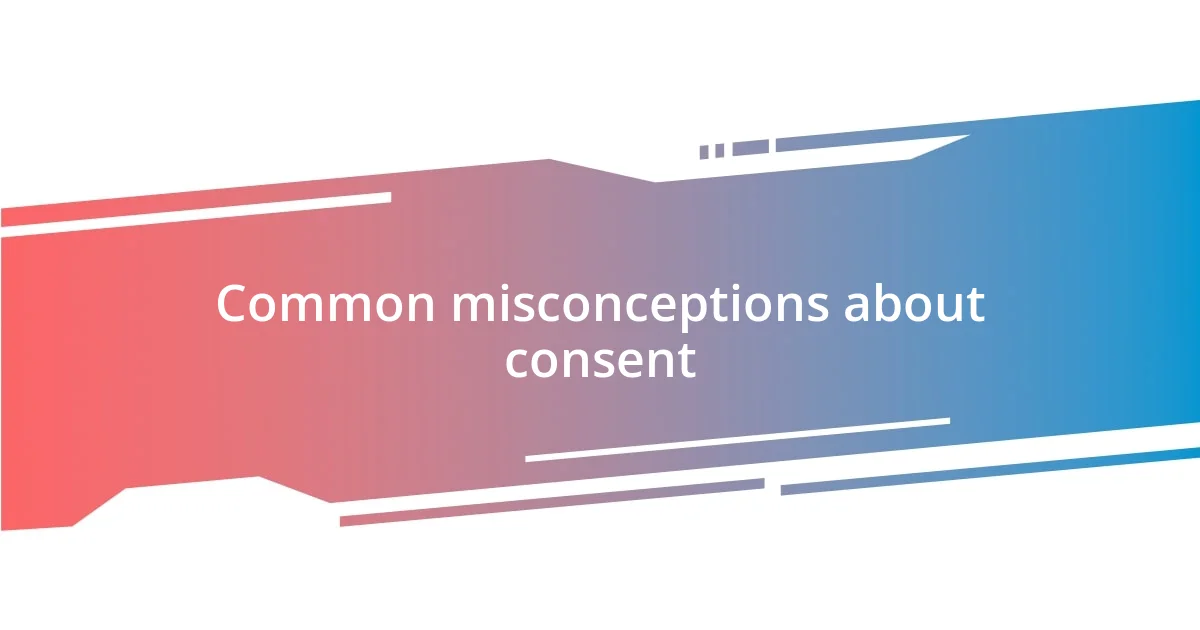
Common misconceptions about consent
One common misconception about consent is that it can be assumed through prior relationships or encounters. I’ve encountered situations where someone believed that because we had shared a connection before, my willingness to participate had been pre-established. It’s disheartening to realize that this flawed logic overlooks the importance of communication. Every interaction is unique, and I firmly believe that clear and direct conversations about boundaries are essential, regardless of past experiences.
Another misconception is the idea that consent is only necessary at the beginning of an interaction. I vividly recall an experience where I initially agreed to something, but as the situation evolved, I felt uncomfortable. It became evident to me that consent should be an ongoing dialogue. Shouldn’t we all have the freedom to change our minds? It’s not just about that one enthusiastic ‘yes’—it’s about checking in with each other throughout the experience to ensure everyone feels safe and respected.
Lastly, many people believe that non-verbal cues alone can imply consent. I remember an instance at a party where someone interpreted a smile as permission. It struck me how easily this can lead to misunderstandings. While non-verbal communication plays a crucial role, I think relying solely on gestures can be risky. Have you ever felt uncomfortable because someone misinterpreted your body language? I bet many of us have. That’s why I advocate for explicit communication; it eliminates ambiguity and creates a space where everyone feels empowered to express their true feelings.
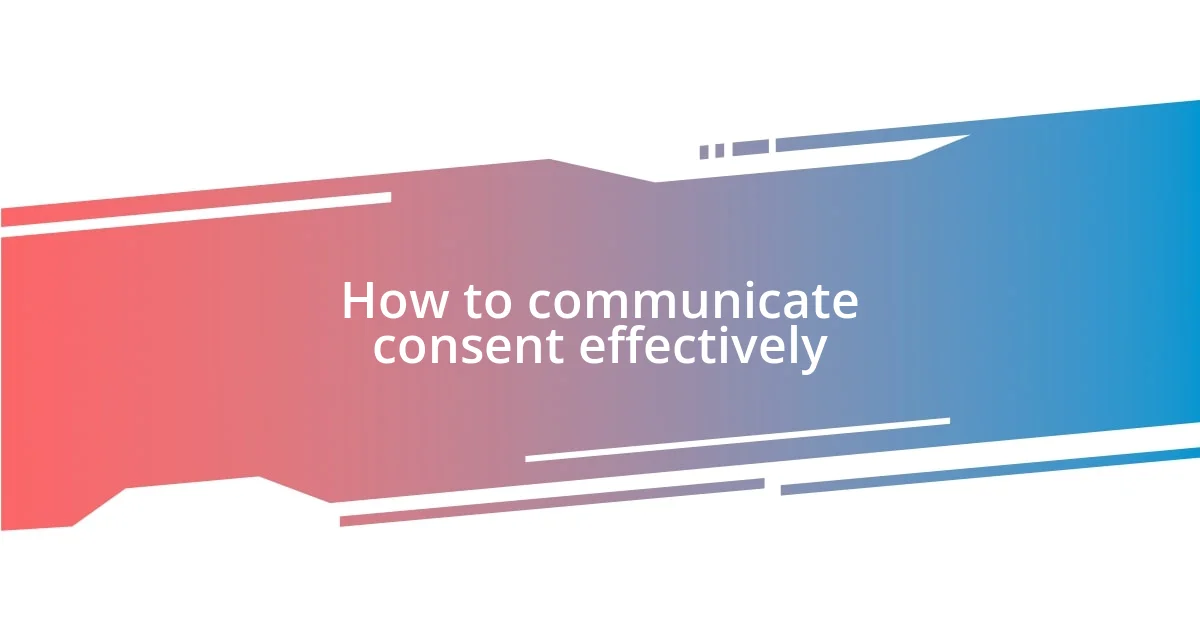
How to communicate consent effectively
One of the most effective ways I’ve found to communicate consent is through open, honest conversations. It might feel a bit awkward at first, but asking questions like, “How are you feeling about this?” or “What do you really want?” can pave the way for deeper intimacy. I vividly remember a time when I asked a simple question during a sensitive moment, and it completely transformed our connection. Wasn’t that the conversation we needed to have?
Body language plays an undeniable role as well, but I’ve learned not to rely solely on it. In one instance, I noticed my partner’s hesitation when we were getting closer. Instead of sweeping that uncertainty aside, I decided to halt the moment to check in. That conversation led to a beautiful exchange where we could both express what we truly felt. How often do we assume our partner’s feelings without truly knowing them?
Finally, actively inviting feedback creates a positive atmosphere for consent. I remember a relationship where we made it a point to regularly check in with each other. We would often say things like, “Let me know if you’re ever uncomfortable.” This not only reassured us both but also reinforced a strong, trusting bond. Doesn’t it feel good to know your partner is comfortable expressing their feelings without judgment?










